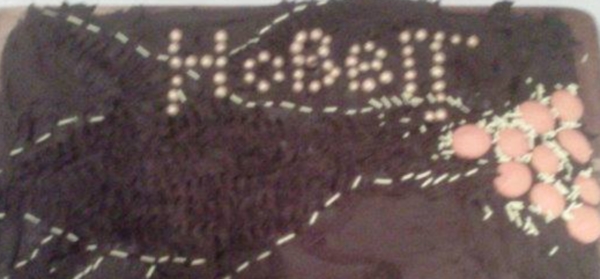
February 7, 2014, by Helen Lovatt
Argonauts and hobbits
When I was reading The Hobbit with my son, I was repeatedly struck by how much Bilbo Baggins resembles Jason in Apollonius’ Argonautica. He is a reluctant hero, who doesn’t want to have an adventure. He is inveigled into it against his will. He suffers from repeated bouts of homesickness and a sense of helplessness.
Arguably the homesickness is more like that of Odysseus, who repeatedly laments and longs for home. But Bilbo, like Jason, is part of a team. He’s not the natural leader of the team either: Thorin Oakenshield, especially in the films, has Herculean tendencies. Thorin has elements of Jason too: trying to regain his throne and become a king again.
Notice that Tolkien has made the characters less problematic by dividing their situations and qualities differently. It’s more of a problem if the king (and leader) is weak, unadventurous and resourceless. Bilbo doesn’t like fighting and prefers to use his wits and get help from those stronger than him. That’s how Jason operates too.
We could also draw a connection between the loss of Hercules and the loss of Gandalf. Arguably the loss of Hercules from the Argonautic expedition is the origin of all those lost mentors in film scripts. Note, though, that Ian McKellen does not have a Hylas to look for.
Both are quest narratives: the Argonautic expedition goes ‘there and back again’. That’s the shape of the story: a quest for gold guarded by a dragon (in this case the Golden Fleece), and a return with the gold. It also fits with the Argonauts as the generation before the Iliad, complete with Achilles’ dad and Ajax’s dad (Gimli’s dad).
What about the differences? No gods. No Hera to protect Jason. (Do Tolkien’s elves have something of the divine about them? They are capricious enough. Is Gandalf, like Hercules, semi-divine?)
Most importantly though, no Medea. Someone else does kill the dragon, admittedly, but there’s no hint of Jason as love hero, the power of sexual desire and tragedy to come. There’s no doubt that Smaug combines Aeetes (dangerous in negotiations, uncompromisingly hostile, jealously acquisitive) with the monstrous snake guarding the fleece, who does not have a voice. Does he also take on the role of Medea? The glamour of his dragon charms corrupt Thorin Oakenshield, just as Medea arguably corrupts Jason (or is it the other way around?).
Or is Medea the ring? Something brought home with the treasure, unintentionally, more powerful and dangerous than the enemy, even if it initially seems helpful. What this suggests about Tolkien’s attitude to women is rather disturbing: monstrous and/or objectified. We probably don’t want to think about Ovid’s poem (Amores 2.15 – read it in translation here) in which he imagines himself as the ring on the finger of his beloved in a bizarre sexual encounter.
‘You see Argonauts everywhere, Mum,’ says Jonathan. Maybe he’s right, but this comparison has made me think differently about both texts. Shall I add The Hobbit to the list of versions next time I run the Argonauts module?

Hello! I enjoyed your blog post very much! Just a comment from a Tolkien nerd, here. Gandalf is indeed semi-divine. He is one of the Maiar, an angelic representative of Eru, the one god of Middle-Earth. I think we could argue that Eru is present throughout the text, especially in light of the last few lines.
“Surely you don’t disbelieve the prophecies just because you helped them come about. You don’t really suppose do you that all your adventures and escapes were managed by mere luck? Just for your sole benefit? You’re a very fine person, Mr. Baggins, and I’m quite fond of you. But you are really just a little fellow, in a wide world after all.”
Thanks Julian! This is very helpful – in particular it helps me to understand some of what is going on with the Argonauts in more recent fantasy writing, such as Bob Holdstock’s Merlin Codex. I clearly need to learn more about the mythology of Tolkien. The relationship between the Argonauts’ main divine sponsor, Hera, and Hercules is rather a fraught one. His name ‘Herakles’ can be etymologised as glory of Hera – but she persecutes him. In Apollonius this relationship is not emphasised, but in Valerius Flaccus she deliberately removes him from the expedition.
Ah, I’m really glad you found my comment helpful! 🙂 I just remembered something you might find interesting. Apparently several members of Tolkien’s literary circle, the ‘Inklings,’ tried without success to write a play about Medea. But to be honest, I think the only demonstrable connection between Tolkien’s legendarium and the classical world (outside of Christianity) is that of Atlantis, as it provided the foundational story for Numenor. I’m afraid I can’t comment on The Merlin Codex, as I haven’t read it. Hmm, would I be right in saying that Valerius Flaccus is following the typical pattern for the characterisation of Hera, in that she pursues vengeance against Zeus’ illegitimate children? And might he be influenced by Vergil’s characterisation of Juno?
Yes, Valerius draws extensively on Virgil, and indeed Hera often persecutes Hercules, just not in Apollonius. Very interesting about the Inklings and Medea. Puts a new slant on the White Witch…